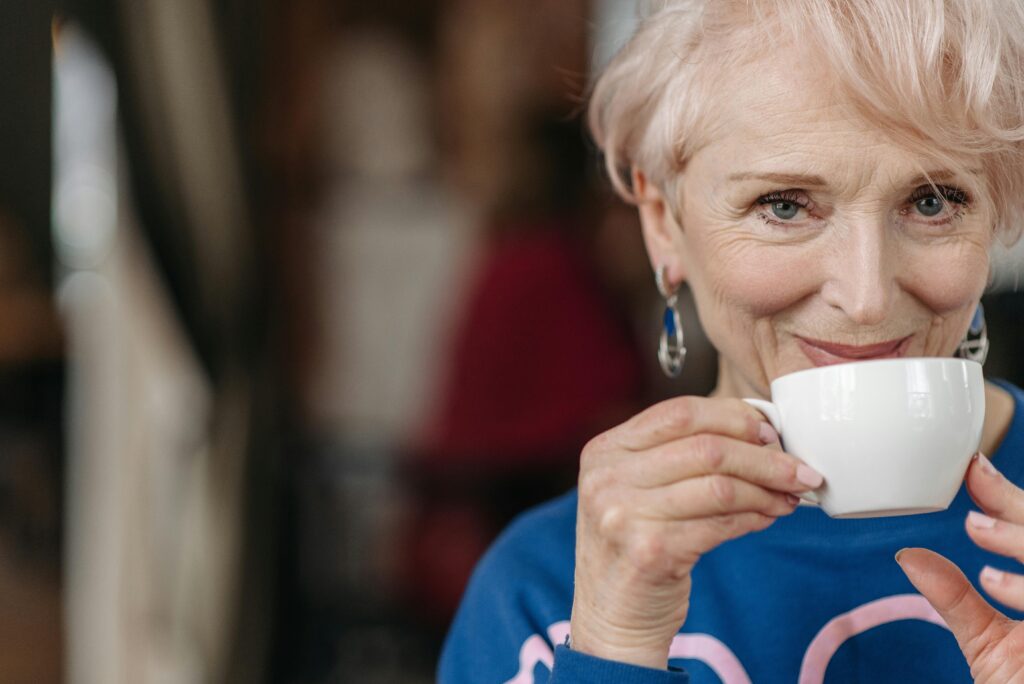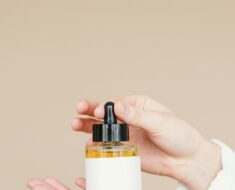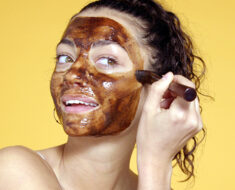Have you ever wondered if your daily cup of coffee is secretly aging your skin?
It’s a question that often lingers as we indulge in that morning ritual.
Could our beloved brew be affecting more than just our energy levels?
Let’s delve into the caffeinated conundrum and explore the relationship between coffee and the aging process.
Here, does coffee make your skin darker?
Does coffee age your skin?
Coffee contains antioxidants that can be beneficial for the skin, but excessive consumption may contribute to premature aging.
Caffeine can dehydrate the skin, leading to fine lines and wrinkles.
Additionally, coffee is acidic, potentially disrupting the skin’s pH balance and causing dryness.

Moderate coffee intake, combined with proper hydration and skincare, may not significantly age the skin.
However, excessive consumption and inadequate hydration could potentially contribute to skin aging.
It’s essential to maintain a balanced lifestyle, including proper hydration and skincare, to mitigate any potential negative effects of coffee on the skin.
Here, disadvantage of coffee on skin
7 causes- Coffee age your skin
1. Dehydration:
One significant factor contributing to the aging effects of coffee on the skin is dehydration.
Caffeine, a natural diuretic present in coffee, stimulates increased urine production, leading to fluid loss from the body.
Dehydration can result in dry and dull skin, accentuating the appearance of fine lines and wrinkles.
When the skin lacks proper hydration, it loses elasticity, making it more prone to sagging and premature aging.
2. Acidic Nature:
Coffee is acidic in nature, and excessive consumption can disrupt the skin’s pH balance.
The skin’s natural pH is slightly acidic, serving as a protective barrier against harmful microorganisms.
Regular intake of acidic substances, like coffee, may compromise this balance, making the skin more susceptible to damage.
An altered pH can weaken the skin’s defense mechanisms, potentially leading to increased sensitivity, redness, and inflammation, all of which contribute to the aging process.
Here, coffee ground for skin whitening?
3. Reduced Blood Flow:
Caffeine, while providing a temporary energy boost, can also lead to vasoconstriction, the narrowing of blood vessels.
This constriction reduces blood flow to the skin, depriving it of essential nutrients and oxygen.
Insufficient blood supply hinders the skin’s ability to repair and regenerate, accelerating the aging process.
Over time, this diminished circulation can manifest as a dull complexion, uneven skin tone, and a lack of radiance.
4. Impact on Collagen Production:
Collagen, a protein responsible for skin elasticity and firmness, is crucial for maintaining youthful skin.
However, excessive coffee consumption may interfere with collagen production.
Caffeine has been shown to inhibit collagen synthesis, potentially leading to a loss of skin suppleness.
Weakened collagen fibers contribute to the formation of wrinkles and fine lines, making the skin appear aged and less resilient.
5. Inflammatory Response:
Coffee can trigger an inflammatory response in some individuals, exacerbating skin conditions associated with aging.
Chronic inflammation is linked to accelerated aging, as it breaks down collagen and elastin fibers.

Inflammation also promotes the production of free radicals, damaging skin cells and contributing to premature aging.
Those with sensitive skin or existing inflammatory skin conditions may experience worsening symptoms with prolonged coffee consumption.
6. Stimulation of Cortisol Production:
Coffee consumption stimulates the release of cortisol, a stress hormone associated with various negative effects on the skin.
Elevated cortisol levels can lead to increased sebum production, contributing to oily skin and acne.
Chronic stress and high cortisol levels are linked to collagen degradation, exacerbating the formation of wrinkles.
The cumulative impact of heightened cortisol secretion can leave the skin looking tired, aged, and prone to breakouts.
Here, coffee for skin care?
7. Insomnia and Sleep Disruption:
Regular consumption of coffee, especially in the latter part of the day, can interfere with sleep patterns, leading to insomnia.
Quality sleep is crucial for skin repair and regeneration. During deep sleep, the body releases growth hormones that promote cell turnover and repair damaged skin cells.
Insufficient or disrupted sleep prevents the skin from undergoing these essential processes, resulting in a tired and aged appearance.
Dark circles, fine lines, and a lack of skin brightness are common consequences of inadequate sleep, further contributing to premature aging.
Is coffee bad for skin aging?
While moderate coffee consumption has some health benefits, excessive intake may contribute to skin aging.
Coffee’s diuretic effect can lead to dehydration, affecting skin elasticity and promoting wrinkles.
Its acidic nature may disrupt the skin’s pH balance, causing sensitivity and inflammation.
Additionally, caffeine’s impact on collagen production, blood flow, and cortisol levels can contribute to premature aging.
Balanced consumption and proper hydration mitigate these effects, but excessive coffee intake may have negative consequences on skin health and accelerate the aging process.
Here, coffee for sin brightening
Is Coffee Good For Slow Aging?
Yes, coffee can have potential anti-aging benefits. Rich in antioxidants, coffee helps combat free radicals that contribute to aging.
Chlorogenic acids in coffee may support collagen production, promoting skin elasticity.
Caffeine stimulates blood flow, reducing the appearance of fine lines and cellulite. The polyphenols in coffee may also have protective effects against UV radiation, aiding in skin health.
However, moderation is key, as excessive consumption can lead to dehydration and other negative effects.
In a balanced approach, enjoying coffee can be part of a strategy to support overall well-being and potentially slow the aging process.
Side effect of coffee on face
Excessive coffee consumption can have adverse effects on the face.
Caffeine’s diuretic properties may lead to dehydration, causing dryness and accentuating fine lines.
The acidic nature of coffee can disrupt the skin’s pH balance, leading to sensitivity, redness, and inflammation.
Prolonged consumption may inhibit collagen production, contributing to a loss of skin elasticity.
Coffee’s impact on blood flow and cortisol levels can exacerbate issues like acne and oily skin.
Additionally, disrupted sleep due to excessive caffeine intake may result in dark circles and a tired appearance. Moderation is crucial to prevent these negative side effects on facial skin.
Related faq’s
Does coffee affect skin aging?
Yes, coffee can influence skin aging. While it contains antioxidants that combat free radicals, excessive consumption may dehydrate the skin, accentuating wrinkles.
The acidic nature of coffee can disrupt the skin’s pH balance, leading to sensitivity and inflammation.
Caffeine’s impact on collagen production, blood flow, and cortisol levels can contribute to premature aging.
Moderate coffee intake and adequate hydration can mitigate these effects, but excessive consumption may negatively impact skin health and accelerate the aging process.
Does quitting coffee make you look younger?
Quitting coffee may contribute to a more youthful appearance. Caffeine’s diuretic effect can cause dehydration, emphasizing fine lines and wrinkles.
By eliminating coffee, skin hydration improves, promoting a smoother complexion.
Additionally, reduced caffeine intake may lead to better sleep quality, allowing the skin to undergo essential repair processes during rest.
While individual responses vary, quitting coffee can positively impact skin health and contribute to a fresher, more youthful look.
Do coffee drinkers look younger?
While the relationship between coffee consumption and aging is complex, some studies suggest that moderate coffee intake, with its antioxidant properties, may have positive effects on skin health.
The antioxidants in coffee can potentially counteract the damage caused by free radicals, contributing to a healthier complexion.
However, excessive coffee consumption may lead to dehydration and other negative effects.
Overall, a balanced approach to coffee consumption, coupled with a healthy lifestyle, may contribute to a more youthful appearance for some individuals.
How much does coffee age you?
The extent to which coffee ages you depends on various factors, including individual tolerance, consumption levels, and overall lifestyle.
Excessive coffee intake may contribute to dehydration, accentuating fine lines, and wrinkles. The acidic nature of coffee can potentially impact skin health.
However, when consumed in moderation and accompanied by proper hydration, antioxidants in coffee may offer some protective effects.
Ultimately, moderation is key, and factors such as hydration, diet, and skincare routines play crucial roles in mitigating potential aging effects.
Conclusion:
In conclusion, while moderate coffee consumption offers various health benefits, its impact on skin aging remains inconclusive.
Balancing your coffee intake with hydration and a skincare routine is key.
Embrace a holistic approach for radiant skin, recognizing that lifestyle factors play a crucial role in maintaining a youthful appearance.






